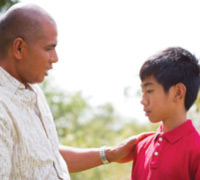Writer Markus Zusak in his internationally acclaimed book I am Messenger puts it most elegantly, “Sometimes people are beautiful. Not in looks. Not in what they say. Just in what they are.” For teens, this may be hard to digest. When our children approach puberty they become increasingly conscious of their body image. Body image refers to how we feel about our bodies both internally and externally, teens however, favour the latter. They want to look good in a particular way, whether it’s weight, hair style, tummy circumference, biceps, or perkiness of the lips. It’s all about how others perceive them and whether they can ‘fit in’ or ‘be accepted’.
Girls as young as 6 years old start to be more conscious about their body image and are more likely to be dissatisfied with their bodies than boys. The desire to be thinner is also more prevalent in girls.
However, being obsessively concerned about weight or appearance may affect your child’s physical and mental health especially if a child thinks that he or she isn’t quite up to the social par, so to speak. Consequently, negative feelings can sap away self-esteem, cause social impairment and in extreme cases, set the stage for eating disorders like anorexia and bulimia.
Therefore, we should help our children develop a healthy and positive body image. A positive body image means that your child should like their body as it is, appreciate it, and celebrate its unique qualities and capabilities. Parents can help to achieve this through different methods:
Be a role model
The apple doesn’t normally fall far from the tree. This is true considering that one of the earliest and most influential role models for children is their parents. Therefore, you should set an example by practicing a healthy diet, exercising regularly and live healthily as you would want your child to do as well.

Be affirmative
Some parents think it’s fine to publically joke or criticize their child’s weight or appearance in front of the child. Others may provide negative comments (i.e. “Don’t worry about it, we have a human disposal machine, my son will finish the leftovers, nothing goes to waste in our house!”) as a way of encouraging their children to change. This only deepens the child’s wounds (even though you might find it trivial or laughable) and may even be traumatic and affect them psychologically long term. So change your approach, be proactive and positive instead – give encouraging words, reassure them and above all make sure they know you love them no matter what.

Communicate with each other
It’s important that the child have someone to talk to in order to express their feelings and concerns. Discuss about developmental changes that happen for children their age but speak at a level they can relate to and understand. Try to empathize and comprehend the situation from their point of view. Also, why not talk about your body image experiences when you were a teenager and what you did or how you felt during that time. Talking to your child also helps build his trust towards you and strengthens the parent-child relationship.

Foster a positive attitude
Whether your child is light or full-bodied, abnormally short or tall, you must always tell them that they should be happy and proud of their bodies. Build their confidence, reaffirm to them that each and every person is different and unique in their own way and ultimately it is who we are as a person that matters most. Encourage them to join volunteer work, community-aid societies or other similar groups or activities that can help them build their character, charisma and personality. It’s also a chance to build new relationships, connect with different people of different backgrounds and it also helps boost their self-esteem and confidence as well as discover qualities about themselves that maybe they never knew existed (i.e. leadership, cooking skills, commanding voice, artistic creativity, etc.).
Parents must ensure that their teens understand that the perfect outward body image isn’t everything but that one which is positive and healthy should be encouraged and emphasized. It may be hard at first since many unavoidable factors (peer, media or societal influence) contribute towards inception of the concept of the ‘ideal body’. Inculcate the values you want them to aspire for and start developing them from young.
An educational collaboration with National Population and Family Development Board Malaysia.







Comments